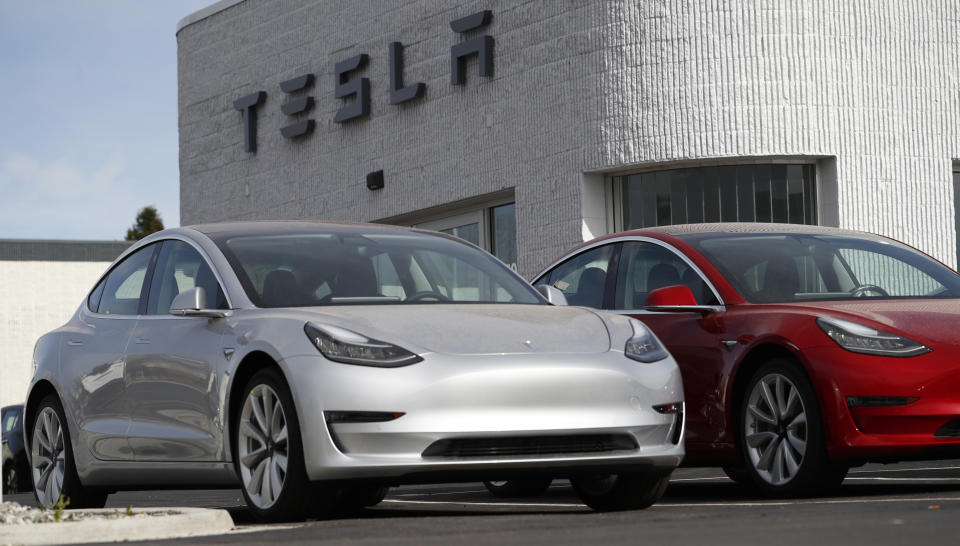Tesla's move to close stores puts dealer franchise debate into spotlight
For years, Tesla CEO Elon Musk has repudiated state laws that prevent car manufacturers from owning and operating stores to sell vehicles directly to consumers.
On Thursday, the company took a divergent strategy, moving worldwide sales for its $35,000 Model 3 online, and announcing plans to shutter an unspecified number of its 131 physical stores. “Shifting all sales online, combined with other ongoing cost efficiencies, will enable us to lower all vehicle prices by about 6% on average,” Tesla said Thursday in a press release.
Tesla (TSLA) plans to keep a number of its stores open and transform them into galleries or information centers where customers can both see and learn about vehicles, first hand, a Tesla spokesperson told Yahoo Finance, adding that the transition is expected to take several months. The decision will test Tesla’s ability to maintain strong sales without physical locations where it can sell vehicles directly to consumers. The move will also likely draw legal challenges, stock research firm JMP said in a report.
“Tesla’s company-owned stores have required special exemption from decades-old dealer franchise laws,” said JMP. “While Tesla will likely assert that it indeed will have sufficient resources to maintain the consumer safety of the fleet, we expect a number of legal challenges to this move.”
What form those legal challenges would take is unclear.
Tesla said it plans to increase investment in its vehicle service capability and use mobile technicians in the absence of physical service locations. “[W]e guarantee service availability anywhere in any country in which we operate,” the company said.
“We will be significantly increasing headcount in service technicians,” Musk added Thursday during a conference call with reporters.
The laws, which Musk has been fighting, were enacted between the 1930s and 1950s in efforts to stop the Big Three (Ford, General Motors and Chrysler) from strong arming dealerships into purchasing more product than demand warranted. Essentially, the intent of the law was to protect dealerships from assuming the bulk of the risk in franchise relationships. As part of the parties’ negotiated remedies, states adopted laws prohibiting car manufacturers from direct-to-customer sales. The idea is that it would prevent manufacturers from directly competing with franchisees.
“If [Tesla’s] now saying they really don't want to rely very much on bricks and mortar at all, it does seem to me to at least in part moot this whole question about direct distribution,” said University of Michigan law professor Dan Crane, who has worked closely with Tesla on dealership laws since 2014. (Crane has never been retained by or received compensation from the company.)
Dealer franchise laws ‘not applicable to Tesla’

Regardless of Tesla’s decision to close some stores, Crane said dealership laws, which were created to protect mom-and-pop businesses, are not applicable to Tesla because the company has never endeavored to use dealers, and therefore has no risk of competing with franchisees.
“The whole premise of this is, if you are franchising a dealer, you will be unfair to them if you can also open your own store,” Crane said. “We don't just have the Big Three any more. We have a much more competitive car market so the bargaining power has changed. There are six dealership groups in America, that have more annual revenue than Tesla does.”
Another argument dealers have raised in court to keep Tesla out of the U.S. markets they serve is that allowing Tesla to operate without dealerships would put dealers out of business and lead to job loss. “If [Tesla] can have bricks and mortar in the state that means paying local taxes, hiring local people to work there, and so forth,” Crane said. “It’s a complete red herring,” he said, referring to the dealer’s job loss argument against Tesla.
Tesla declined to say whether it expects legal challenges based on its decision to close stores and whether it will continue to pursue pending or future dealership legislation reforms.
Tesla is also a threat to car makers
“The real story is that dealers have woken up to realize that their business model is under attack,” Crane said. “Frankly Tesla is not their biggest problem,” he said, pointing out the shift away from individual ownership and towards ride sharing companies like Uber and Lyft. “They are I think recognizing that their days are numbered, and they see the possibility of being cut out by manufacturers who go directly to consumers.”
But for now, car manufacturers appear to be on dealers’ side, at least when it comes to Tesla. Manufacturers are using their weight against Tesla, Crane said.
“Frankly it's GM as well because GM doesn't want to see Tesla get an advantage, so the dealers, aided and abetted by GM in particular, have seen that their best bet is to slow Tesla by trying to make Tesla use dealers which they know isn't viable for Tesla, and that effectively keeps Tesla out of states.”
As of January 26, Tesla had still been pushing for legislation in Connecticut, Nebraska, New Mexico, Oklahoma, South Carolina and West Virginia that would allow it to expand its retail and service presence in those states.
Alexis Keenan is a New York-based reporter for Yahoo Finance. She previously produced live news for CNN and is a former litigation attorney. Follow her on Twitter at @alexiskweed
More from Alexis:
Google boosts the odds that sexual harassment cases will see the light of day
How the legal fight over Trump’s border wall could hurt the economy
Weed consumers no longer ‘stoner that lives in his mom’s basement’: CEO
NYPD: Waze users who post sobriety checkpoints may be committing crimes
How legalized cannabis changed Colorado in the past five years

